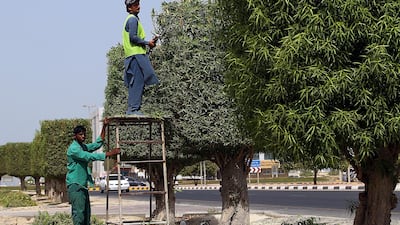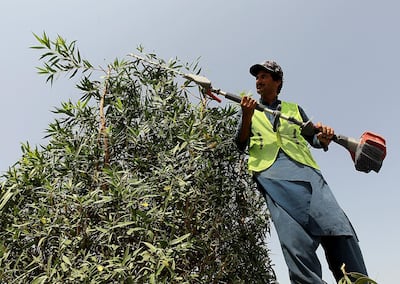Thousands of trouble trees causing a menace in neighbourhoods in Umm Al Quwain are to be felled.
Municipality officials in the emirate are offering to remove the danger Damas trees for free - as they say the fast-growing species is the root cause of widespread damage to underground pipe networks, drains and walls.
Private landscape gardeners usually charge around Dh500 for their removal, often pouring hot oil over the stump to guarantee it does not survive.
Umm Sultan, a 47-year-old Moroccan mother-of-four living in a one-story house in Al Ramla, said roots of nearby Damas trees had blocked her well.
“My husband planted about 11 trees seven years ago to create shade around the house but he didn’t know that this would happen,” she said.
“They produce a very bad smell, attract insects and caused us allergies so we wanted them removed.
“Roots started blocking our well and came through the ground into the house so I contacted the municipality to come and remove them.”
Damas trees, or Conocarpus lancifolius, is native to coastal areas of Somalia, Djibouti and Yemen.
The species - which can grow up to 18 metres tall - is found throughout the Horn of Africa, the Arabian peninsula, and South Asia.
Because of its relative tolerance to heat, drought and salt, the tree is particularly popular across the UAE.
Gardeners and landscapers have planted them as a quick solution to providing shade or as a barrier to strong winds.
Eng Talal Suaifan, head of the agricultural department at Umm Al Quwain municipality, said an estimated 7,000 Damas trees were currently growing within the emirate.
He said the extensive damage they were known to cause should make gardeners and city planners think twice about using them and that alternatives such as Al Sidr trees or the Acacia tortilis were a much better bet.
He also said tree could impact other trees and plants around it owing to its roots, which spread horizontally and could reach lengths of up to 15 metres.
“Removing a tree can cost more than Dh500 but we’re offering the service for free,” he said.
“We want to spread awareness of the dangers associated with growing Damas. It can cause damage to the underground pipes, walls and drains.
“Uprooting the tree requires heavy machinery and a lot of work because of the length of the roots.
“They grow horizontally to find water which can also affect other trees and plants in the same area. In some cases we use hot oil to prevent it from growing again.”
Speaking to The National, the owner of three tree nurseries in Umm Al Quwain said the species was becoming less commonplace due to the problems it caused.
He said the tree had been extremely popular through the 1980s, but that he now only sold around one a month.
“Small Damas trees cost about Dh10 so they’re cheap compared to others and grow fast,” said Matthew M, 61.
“People planted them around the house to provide privacy and shade. They can reach six metres in just two years.
“We used to sell many in the past but now people are more aware of its disadvantages and chose other species.
Officials in UAQ said they planned to distribute brochures to residents and well as advertise the scheme on social media.
Last year, Dubai Municipality received around 20 complaints about damage caused by Damas trees being planted near homes.
In 2012, the developer Emaar issued a warning to Dubai communities saying all Damas trees should be felled because their roots were blocking drains.


